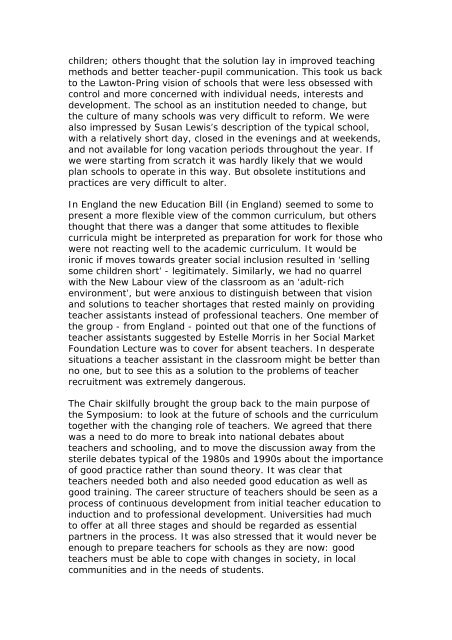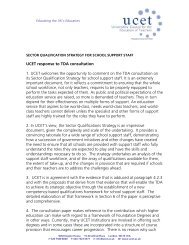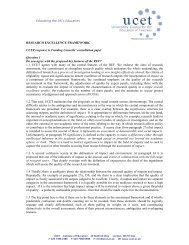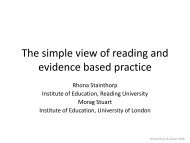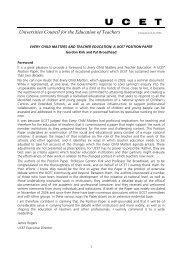The School Curriculum Ten Years Hence - UCET: Universities ...
The School Curriculum Ten Years Hence - UCET: Universities ...
The School Curriculum Ten Years Hence - UCET: Universities ...
Create successful ePaper yourself
Turn your PDF publications into a flip-book with our unique Google optimized e-Paper software.
children; others thought that the solution lay in improved teaching<br />
methods and better teacher-pupil communication. This took us back<br />
to the Lawton-Pring vision of schools that were less obsessed with<br />
control and more concerned with individual needs, interests and<br />
development. <strong>The</strong> school as an institution needed to change, but<br />
the culture of many schools was very difficult to reform. We were<br />
also impressed by Susan Lewis’s description of the typical school,<br />
with a relatively short day, closed in the evenings and at weekends,<br />
and not available for long vacation periods throughout the year. If<br />
we were starting from scratch it was hardly likely that we would<br />
plan schools to operate in this way. But obsolete institutions and<br />
practices are very difficult to alter.<br />
In England the new Education Bill (in England) seemed to some to<br />
present a more flexible view of the common curriculum, but others<br />
thought that there was a danger that some attitudes to flexible<br />
curricula might be interpreted as preparation for work for those who<br />
were not reacting well to the academic curriculum. It would be<br />
ironic if moves towards greater social inclusion resulted in ‘selling<br />
some children short’ - legitimately. Similarly, we had no quarrel<br />
with the New Labour view of the classroom as an ‘adult-rich<br />
environment’, but were anxious to distinguish between that vision<br />
and solutions to teacher shortages that rested mainly on providing<br />
teacher assistants instead of professional teachers. One member of<br />
the group - from England - pointed out that one of the functions of<br />
teacher assistants suggested by Estelle Morris in her Social Market<br />
Foundation Lecture was to cover for absent teachers. In desperate<br />
situations a teacher assistant in the classroom might be better than<br />
no one, but to see this as a solution to the problems of teacher<br />
recruitment was extremely dangerous.<br />
<strong>The</strong> Chair skilfully brought the group back to the main purpose of<br />
the Symposium: to look at the future of schools and the curriculum<br />
together with the changing role of teachers. We agreed that there<br />
was a need to do more to break into national debates about<br />
teachers and schooling, and to move the discussion away from the<br />
sterile debates typical of the 1980s and 1990s about the importance<br />
of good practice rather than sound theory. It was clear that<br />
teachers needed both and also needed good education as well as<br />
good training. <strong>The</strong> career structure of teachers should be seen as a<br />
process of continuous development from initial teacher education to<br />
induction and to professional development. <strong>Universities</strong> had much<br />
to offer at all three stages and should be regarded as essential<br />
partners in the process. It was also stressed that it would never be<br />
enough to prepare teachers for schools as they are now: good<br />
teachers must be able to cope with changes in society, in local<br />
communities and in the needs of students.


